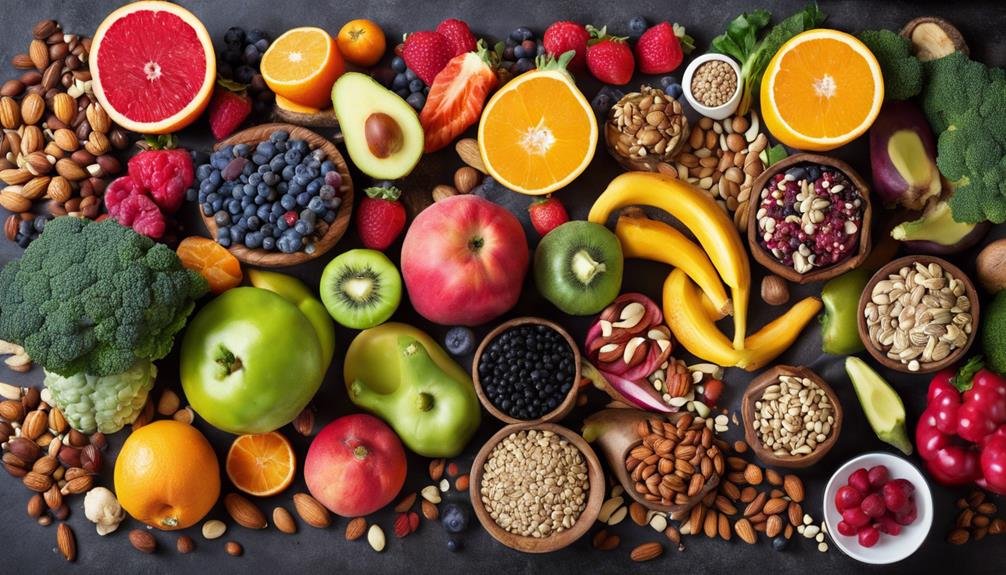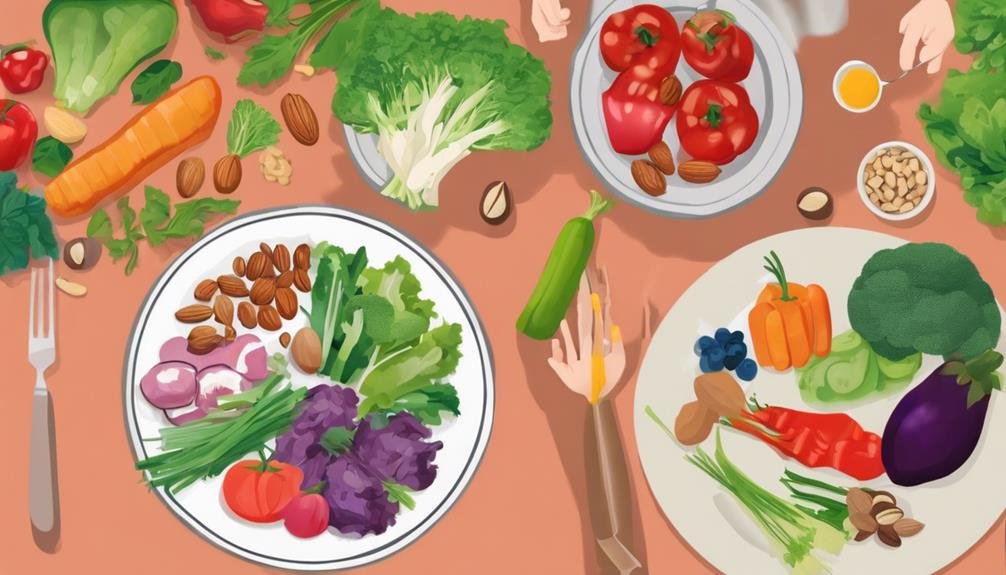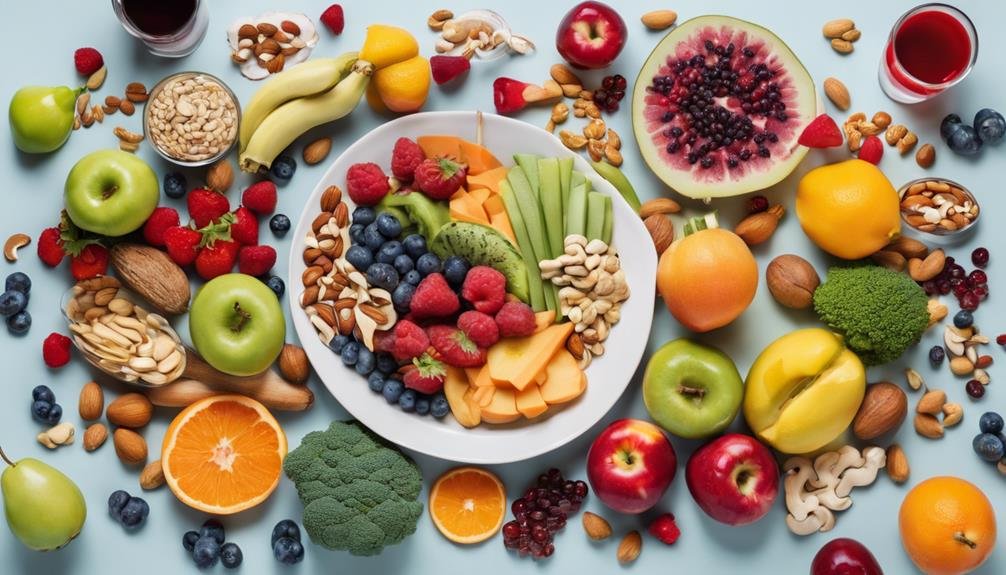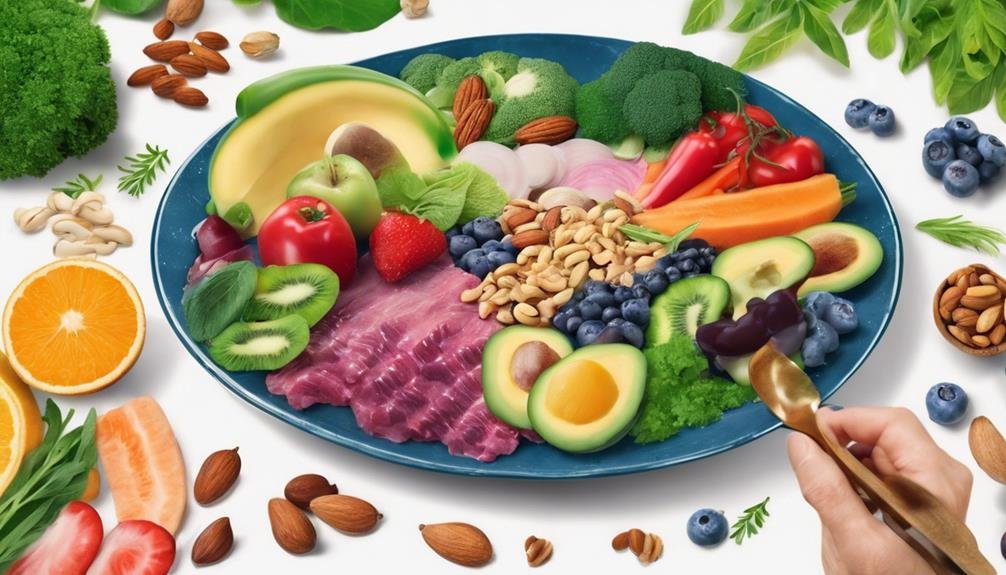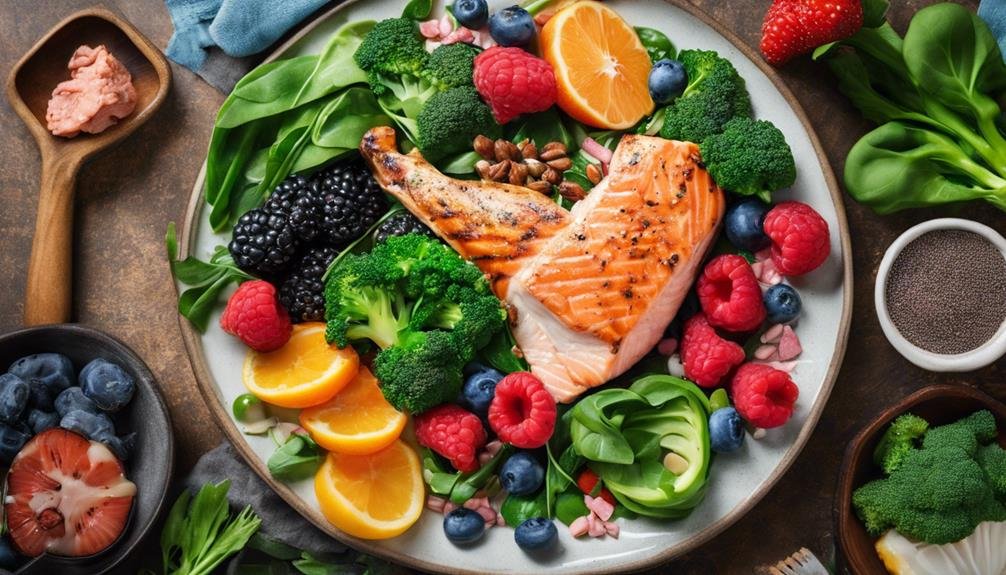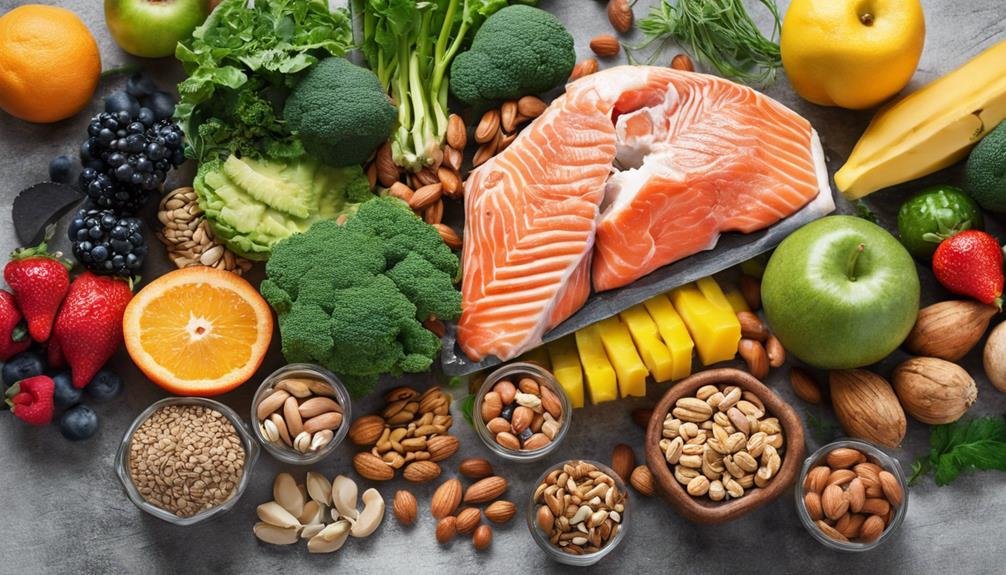Did you know that chronic inflammation plays a significant role in cancer progression, affecting tumor growth and response to treatment? Understanding how the Paleo diet's emphasis on whole, unprocessed foods can potentially modulate inflammatory pathways in cancer patients is crucial. By exploring the anti-inflammatory benefits of this dietary approach, you may uncover valuable insights into how food choices can impact inflammation levels and overall health outcomes for individuals battling cancer.
Understanding Inflammation and Cancer
Inflammation plays a crucial role in the development and progression of cancer. When your body faces inflammation, it triggers a cascade of signals that can lead to changes in the surrounding tissues, making them more susceptible to cancer growth.
Chronic inflammation, often fueled by factors like poor diet, smoking, obesity, and stress, can create an environment conducive to cancer cells multiplying and spreading.
Understanding this connection is vital in the fight against cancer. By recognizing how inflammation fuels cancer progression, you can take proactive steps to reduce inflammation in your body.
Making lifestyle changes, like adopting an anti-inflammatory diet such as the Paleo diet, can help in managing inflammation levels and potentially slowing down cancer growth.
Empowering yourself with knowledge about the link between inflammation and cancer is the first step towards taking control of your health. By making informed choices and embracing anti-inflammatory practices, you can support your body in its fight against cancer.
The Paleo Diet Basics
Embarking on a journey to better health often involves reevaluating dietary choices and exploring options that align with your well-being goals.
The Paleo diet, based on the presumed eating habits of our Paleolithic ancestors, focuses on whole foods such as lean meats, fish, fruits, vegetables, nuts, and seeds while avoiding processed foods, grains, dairy, and sugars. By opting for nutrient-dense foods rich in vitamins, minerals, and antioxidants, you're providing your body with essential building blocks for optimal function. This approach not only supports overall health but may also help reduce inflammation, a key factor in cancer development.
The Paleo diet encourages a balanced intake of macronutrients, emphasizing protein and healthy fats, which can promote satiety and stable energy levels throughout the day. By choosing whole, unprocessed foods, you're fueling your body with natural goodness and minimizing exposure to potentially harmful additives. Making small, sustainable changes towards a Paleo-inspired eating pattern can be a positive step towards improving your health and well-being.
Inflammatory Response Mechanisms
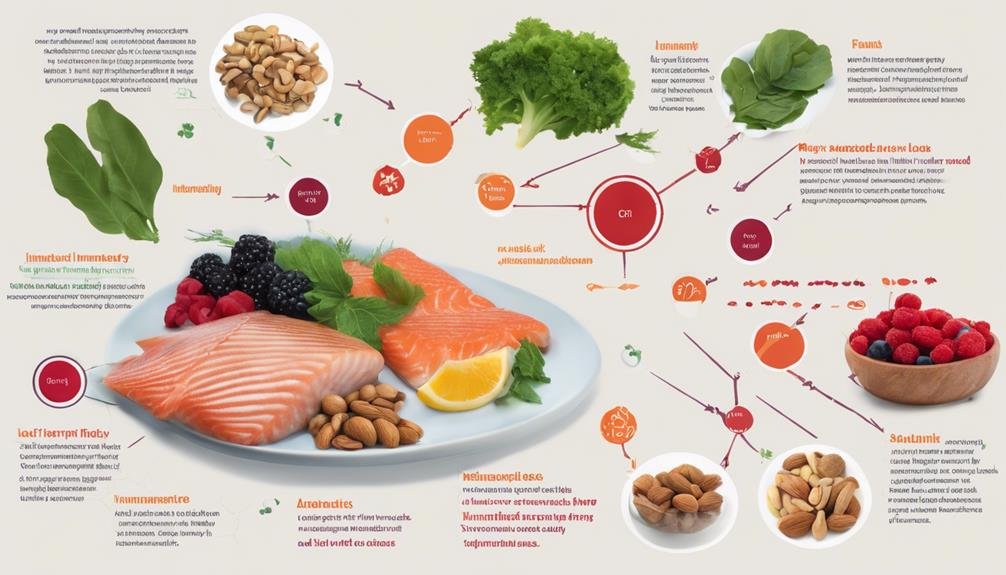
As you continue to explore the Paleo diet's potential impact on health, it becomes crucial to understand the intricate mechanisms of the body's inflammatory response. Inflammation is a natural process initiated by the immune system to protect the body from harmful stimuli like pathogens, damaged cells, or irritants. When this response is triggered, white blood cells release chemicals that help combat these threats. However, chronic inflammation can lead to various health issues, including cancer.
One key player in the inflammatory response is a group of proteins called cytokines. These signaling molecules regulate inflammation, with some promoting it (pro-inflammatory) and others reducing it (anti-inflammatory). When the balance between these cytokines is disrupted, it can contribute to the development and progression of cancer.
Understanding how the body's inflammatory response works is essential in comprehending how the Paleo diet's anti-inflammatory properties may potentially benefit individuals, particularly those battling cancer. By adopting a diet rich in whole foods and antioxidants, you may help modulate inflammation and support your body's natural defense mechanisms.
Impact of Diet on Inflammation
Considering the significant influence your diet can have on your body's inflammatory response, it's crucial to understand how the foods you consume can either fuel or alleviate inflammation. Your dietary choices play a vital role in modulating the levels of inflammation in your body, impacting your overall health and well-being. Here are some key points to keep in mind:
- Processed Foods: These often contain high levels of trans fats, refined sugars, and artificial additives that can trigger inflammation.
- Omega-3 Fatty Acids: Found in fatty fish, flaxseeds, and walnuts, these healthy fats have anti-inflammatory properties.
- Antioxidants: Colorful fruits and vegetables, as well as nuts and seeds, are rich in antioxidants that help combat inflammation.
- Whole Grains: Opt for whole grains like quinoa, brown rice, and oats, which can help lower inflammation compared to refined grains.
- Probiotics: Foods like yogurt, kefir, and sauerkraut can promote a healthy gut microbiome, reducing inflammation in the body.
Anti-Inflammatory Foods to Include
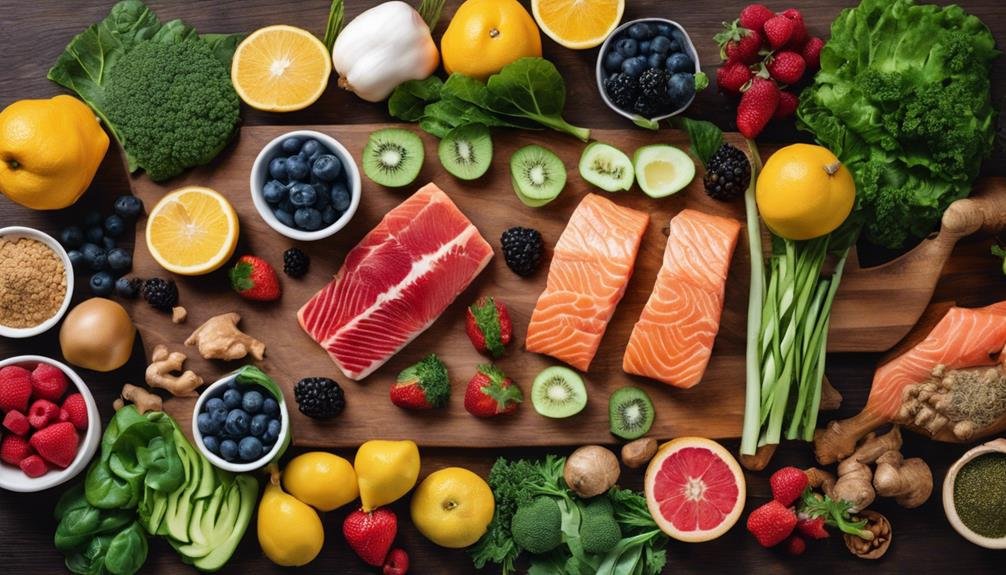
To enhance your body's natural defense against inflammation, incorporating a variety of anti-inflammatory foods into your daily meals can be a beneficial and proactive approach. Including foods such as fatty fish like salmon, rich in omega-3 fatty acids, can help reduce inflammation and support overall health.
Berries, packed with antioxidants, can also play a significant role in fighting inflammation. Adding leafy greens like spinach and kale to your meals provides essential nutrients and anti-inflammatory properties.
Turmeric, a spice known for its powerful anti-inflammatory effects, can be easily incorporated into dishes to boost your body's defense mechanisms. Additionally, nuts and seeds, such as almonds and flaxseeds, are great sources of healthy fats and antioxidants that combat inflammation.
Potential Cancer-Fighting Properties
To continue fortifying your body's defenses against inflammation and potentially supporting the fight against cancer, it's important to explore the potential cancer-fighting properties found in certain foods. Incorporating these foods into your diet can provide you with added protection and support in the battle against cancer.
- Cruciferous vegetables like broccoli and kale contain sulforaphane, a compound known for its anti-cancer properties.
- Berries such as blueberries and raspberries are rich in antioxidants that help combat oxidative stress, a factor linked to cancer development.
- Fatty fish like salmon and mackerel are abundant in omega-3 fatty acids, which have been shown to have anti-inflammatory effects that may aid in cancer prevention.
- Turmeric, a spice commonly found in curry dishes, contains curcumin, a potent anti-inflammatory and antioxidant compound with potential anti-cancer properties.
- Green tea is packed with catechins, powerful antioxidants that have been studied for their potential role in reducing the risk of certain types of cancer.
Studies on Inflammation and Cancer
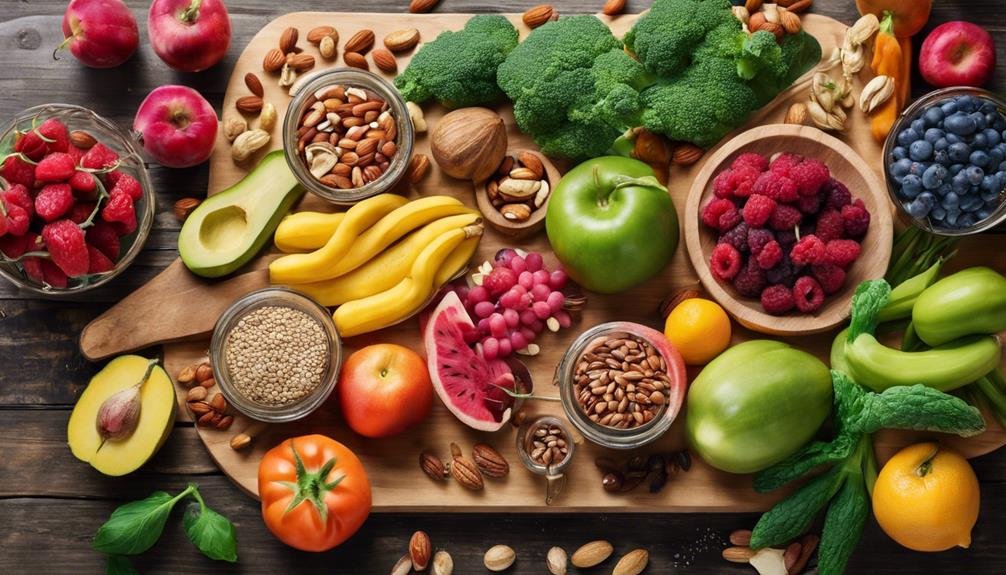
Studying the link between inflammation and cancer reveals valuable insights into how our body's immune response can influence the development and progression of cancer. Research indicates that chronic inflammation can create an environment conducive to cancer growth by promoting genetic mutations, cell proliferation, and evasion of cell death. Inflammation triggers the release of pro-inflammatory molecules that can damage DNA and disrupt normal cell processes, potentially leading to the formation of tumors.
Studies have shown that certain types of cancer, such as colorectal, liver, and stomach cancer, are strongly linked to chronic inflammation. Inflammatory conditions like inflammatory bowel disease have been associated with an increased risk of developing colorectal cancer. Understanding these connections underscores the importance of managing inflammation to reduce the risk of cancer development and progression.
Inflammation Reduction Strategies
As you explore ways to reduce inflammation, you'll find a myriad of strategies that can positively impact your overall health and well-being. Inflammation is a crucial factor in cancer development and progression, making it essential to adopt lifestyle changes that can help mitigate its effects.
Here are some evidence-based strategies to help you combat inflammation and promote better health:
- Healthy Diet: Incorporate anti-inflammatory foods like fruits, vegetables, nuts, and fatty fish.
- Regular Exercise: Engage in physical activity to reduce inflammation and boost your immune system.
- Stress Management: Practice relaxation techniques such as meditation or yoga to lower stress levels and inflammation.
- Adequate Sleep: Prioritize quality sleep to allow your body to repair and reduce inflammation.
- Hydration: Drink plenty of water to flush out toxins and maintain proper bodily functions.
Paleo Diet for Cancer Patients
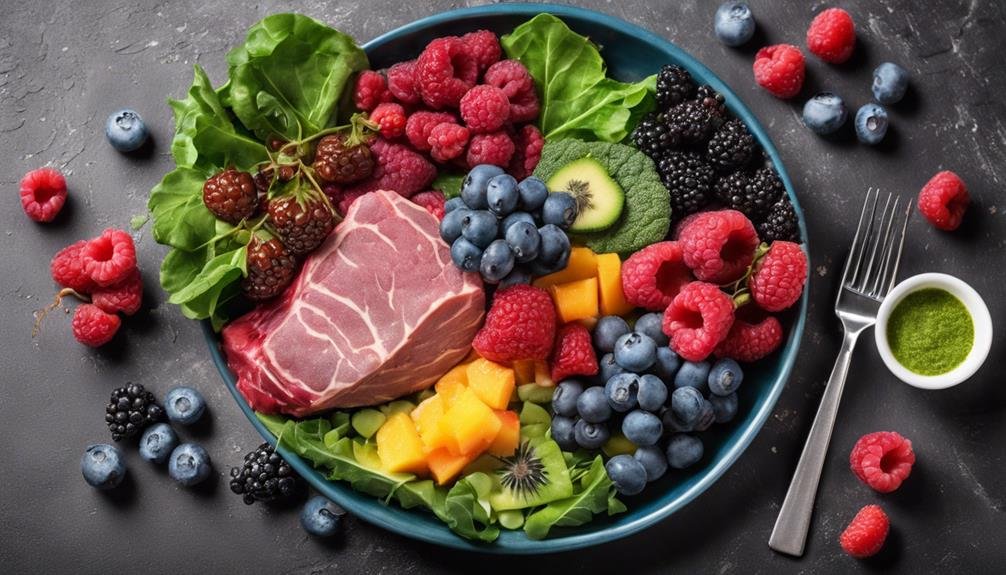
Numerous cancer patients and individuals seeking to enhance their health have turned to the Paleo diet as a potential dietary approach. The Paleo diet emphasizes whole foods, lean proteins, fruits, vegetables, nuts, and seeds while excluding processed foods, grains, dairy, and sugars. For cancer patients, this diet may offer benefits by reducing inflammation and providing essential nutrients that support overall health and well-being.
Studies suggest that the Paleo diet's focus on anti-inflammatory foods can help manage chronic inflammation, a common factor in cancer development and progression. By eliminating processed foods and sugars, which can contribute to inflammation, the Paleo diet may help create a more supportive environment for the body to combat cancer cells. Additionally, the high nutrient density of Paleo-approved foods can aid in maintaining strength and energy levels during cancer treatment.
While more research is needed to fully understand the impact of the Paleo diet on cancer outcomes, many individuals have reported feeling better and experiencing improved health while following this dietary approach. If you're considering the Paleo diet as part of your cancer treatment plan, consult with a healthcare provider or a registered dietitian to ensure it aligns with your specific nutritional needs and treatment goals.
Incorporating Anti-Inflammatory Herbs
Looking to enhance the anti-inflammatory benefits of the Paleo diet for cancer? Incorporating anti-inflammatory herbs can be a wonderful way to boost the healing properties of your meals. Herbs have been used for centuries for their medicinal properties, and here are some powerful options to consider:
- Turmeric: Known for its active compound curcumin, turmeric is a potent anti-inflammatory herb that can help reduce inflammation in the body.
- Ginger: Ginger contains gingerol, a substance with powerful anti-inflammatory and antioxidant properties that can aid in fighting off cancer cells.
- Boswellia: Also known as Indian frankincense, Boswellia is a herb that may help reduce inflammation and prevent the spread of cancer.
- Green Tea: Rich in antioxidants and polyphenols, green tea can help reduce inflammation and protect against cellular damage.
- Garlic: Garlic contains allicin, a compound with anti-inflammatory properties that may also help boost the immune system.
Incorporating these herbs into your meals can't only enhance the flavor but also provide additional anti-inflammatory benefits to support your fight against cancer.
Expert Recommendations and Tips
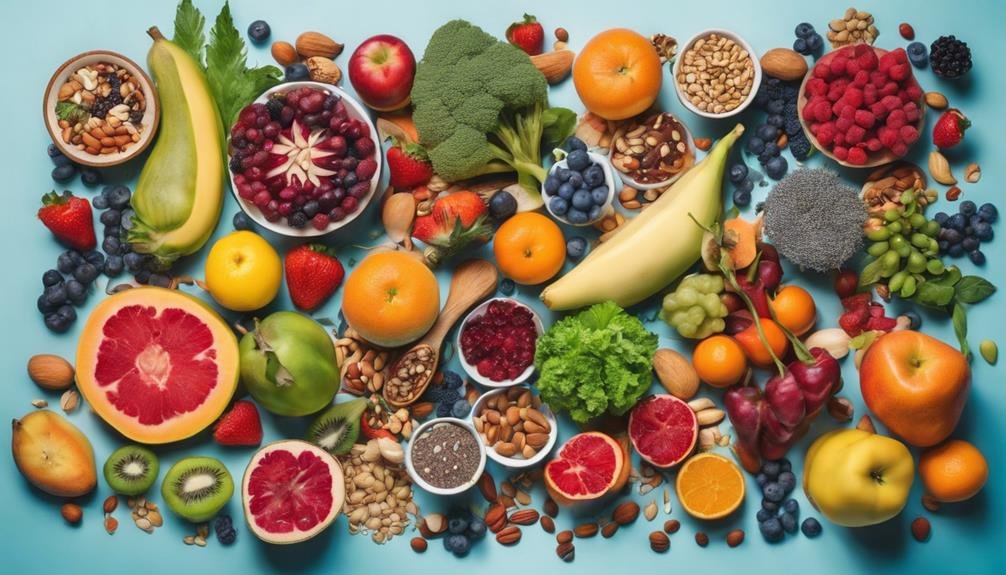
To gain valuable insights on optimizing the anti-inflammatory benefits of the Paleo diet for cancer, expert recommendations and tips can serve as invaluable resources.
Experts suggest focusing on whole, nutrient-dense foods like vegetables, fruits, lean proteins, and healthy fats to reduce inflammation and support overall health. It's important to prioritize organic and grass-fed options when possible to minimize exposure to harmful chemicals and maximize nutrient intake.
Additionally, incorporating herbs and spices with anti-inflammatory properties such as turmeric, ginger, and garlic can further enhance the diet's benefits.
Experts also recommend avoiding processed foods, refined sugars, and unhealthy fats, as these can contribute to inflammation and negatively impact cancer risk.
Staying hydrated, engaging in regular physical activity, and managing stress through techniques like meditation or yoga are also key components of an anti-inflammatory lifestyle.
Future Research Directions
Investigating the potential advancements in understanding the relationship between the Paleo diet and its impact on inflammation in cancer presents an exciting avenue for future research. As we look towards the future, there are several key areas that researchers could focus on to deepen our understanding:
- Long-term Effects: Examining the sustained effects of following a Paleo diet on inflammation levels in cancer patients over an extended period.
- Mechanistic Studies: Delving into the specific biological mechanisms through which the Paleo diet exerts its anti-inflammatory effects in the context of cancer.
- Population Studies: Conducting large-scale studies to explore how the Paleo diet impacts inflammation and cancer risk across different populations.
- Combination Therapies: Investigating the potential synergies between the Paleo diet and traditional cancer treatments to enhance anti-inflammatory effects.
- Biomarker Research: Identifying specific biomarkers that could serve as indicators of inflammation modulation in response to the Paleo diet.
Frequently Asked Questions
Can the Paleo Diet Prevent Cancer Development?
The Paleo diet, rich in whole foods, may aid in cancer prevention. By focusing on fresh fruits, vegetables, lean meats, and healthy fats, you can reduce inflammation in your body. This anti-inflammatory effect is thought to play a role in preventing the development of cancer. While the diet alone can't guarantee prevention, it can certainly contribute to a healthier lifestyle that supports overall well-being.
Are There Specific Paleo-Friendly Foods to Avoid for Inflammation?
Hey there! When following the Paleo diet for inflammation, you might want to steer clear of processed meats, refined sugars, and excessive salt intake. These items could potentially trigger inflammatory responses in your body.
Opt instead for whole, unprocessed foods like fresh fruits, vegetables, lean proteins, and healthy fats. By making these choices, you can help reduce inflammation and support your overall health while sticking to a Paleo-friendly diet.
How Can the Paleo Diet Support Immune System Function?
To support immune function, the Paleo diet emphasizes whole foods rich in vitamins, minerals, and antioxidants.
Foods like leafy greens, berries, nuts, seeds, and lean proteins can help boost your immune system.
By avoiding processed foods and added sugars, you reduce inflammation in the body, allowing your immune system to work more efficiently.
Incorporating these nutrient-dense foods into your diet can help support overall immune health and well-being.
Is There a Recommended Duration for Following the Paleo Diet?
When embarking on the Paleo diet, consider making it a lifestyle choice for long-term benefits. Remember, there isn't a strict timeline to follow this diet; it's more about finding what works best for you.
Can the Paleo Diet Be Customized for Individual Cancer Types?
Yes, the paleo diet can be customized for individual cancer types. By focusing on whole foods, lean proteins, fruits, and vegetables, you can tailor your paleo diet to suit your specific cancer diagnosis.
Consult with a healthcare provider or a registered dietitian specializing in oncology to create a personalized plan that aligns with your treatment and nutritional needs. This approach can potentially help manage inflammation and support overall health during your cancer journey.
Conclusion
In conclusion, the Paleo diet's focus on whole, nutrient-dense foods can help reduce inflammation levels in cancer patients, potentially providing significant benefits in managing the disease. For example, Sarah, a breast cancer survivor, found relief from treatment-related inflammation by following a Paleo diet rich in anti-inflammatory foods like turmeric and leafy greens. As research continues to explore the therapeutic potential of this dietary approach, incorporating the Paleo diet may offer valuable support for cancer patients seeking to enhance their overall well-being.
